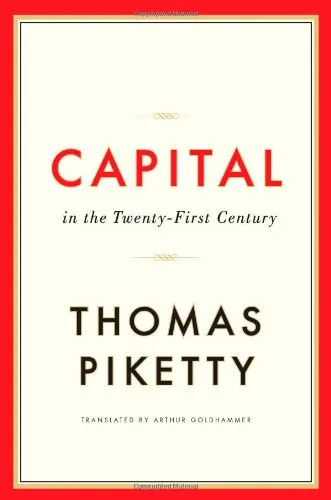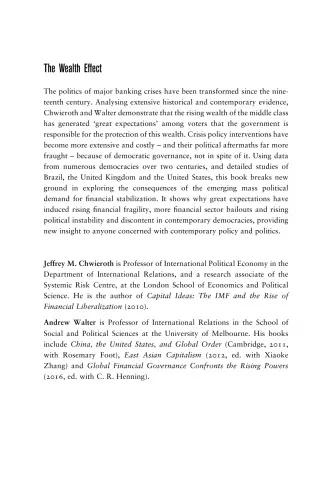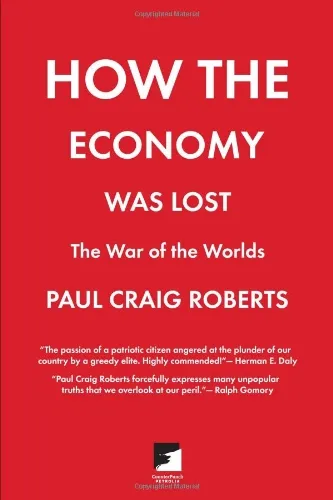Capital in the Twenty-First Century
4.0
بر اساس نظر کاربران

شما میتونید سوالاتتون در باره کتاب رو از هوش مصنوعیش بعد از ورود بپرسید
هر دانلود یا پرسش از هوش مصنوعی 2 امتیاز لازم دارد، برای بدست آوردن امتیاز رایگان، به صفحه ی راهنمای امتیازات سر بزنید و یک سری کار ارزشمند انجام بدینکتاب های مرتبط:
معرفی کتاب "سرمایه در قرن بیست و یکم"
کتاب "سرمایه در قرن بیست و یکم" اثر توماس پیکتی، یکی از مهمترین و برجستهترین آثار اقتصادی است که به بررسی روندهای توزیع ثروت و درآمد درطی بیش از دویست سال میپردازد. این کتاب توانسته است توجه گستردهتری از محققان، سیاستمداران و عموم مردم به خود جلب کند و بحثهای زیادی پیرامون مسائل اقتصادی و اجتماعی ایجاد نماید.
خلاصهای از کتاب
پیکتی در این کتاب به تحلیل تاریخی توزیع ثروت و درآمد میپردازد و نشان میدهد که چگونه نابرابریهای اقتصادی در طول زمان تغییر کردهاند. او به تحلیل دادهها از کشورهای مختلف میپردازد و الگوهایی که در این دادهها دیده میشود را بررسی میکند. یکی از نکاتی که در تحلیلهای پیکتی برجسته است، این است که نرخ بازده سرمایه (r) به طور معمول بیشتر از نرخ رشد اقتصادی (g) بوده است، که این امر به تمرکز ثروت در دست افراد معدود منجر شده است.
نکات کلیدی
- نابرابری درآمد و ثروت یک مشکل تاریخی پایدار است که باید با سیاستهای مناسب به آن پرداخته شود.
- روندهای تاریخی نشان میدهند که نرخ بازده Capital به طور معمول بیشتر از نرخ رشد اقتصادی بوده است، که این امر منجر به تمرکز ثروت میشود.
- پیکتی پیشنهاداتی برای اصلاح نظام مالیاتی و سیاستهای اقتصادی ارائه میدهد تا از شدت نابرابری کاسته شود.
نقل قولهای معروف از کتاب
"نابرابری ثروت و درآمد در هر دورهای میتواند به چالشی اجتماعی و سیاسی بدل شود، اگر بهدرستی دیده نشود و بهموقع تدبیر نشود."
"باید نظامی طراحی کنیم که هر کسی سهم عادلانهای از منابع اقتصادی داشته باشد."
چرا این کتاب مهم است؟
کتاب "سرمایه در قرن بیست و یکم" به عنوان یکی از آثار برجسته اقتصادی، برای افرادی که به دنبال فهم عمیقتری از ماهیت و تاریخچه نابرابریهای اقتصادی هستند، بسیار مهم است. این کتاب نه تنها به تحلیل دادهها و روندهای تاریخی میپردازد، بلکه پیشنهاداتی عملی برای حل مشکلات نابرابری و ایجاد یک نظام اقتصادی عادلانهتر ارائه میدهد. با توجه به سناریوهای اقتصادی جهانی کنونی، مطالب این کتاب همچنان کاربردی و مرتبط هستند و میتوانند راهنمایی مؤثر برای سیاستگذاران باشند.
Introduction to Capital in the Twenty-First Century
Welcome to an exploration of economic history through the lens of capitalism's evolution and its impact on contemporary society. "Capital in the Twenty-First Century," authored by Thomas Piketty and translated by Arthur Goldhammer, critically examines the dynamics of wealth and income inequality both historically and in modern times. Through rigorous analysis and empirical data, Piketty uncovers important insights about how wealth distribution has shaped and will continue to shape the economic landscape.
Detailed Summary of the Book
"Capital in the Twenty-First Century" embarks on a comprehensive journey through three centuries of economic history, scrutinizing the fundamental forces that govern capital and inequality. Piketty presents an in-depth narrative supported by extensive data collection from multiple countries, particularly focusing on Europe and the United States. His central thesis revolves around the idea that when the rate of return on capital (r) exceeds the growth rate of the economy (g), wealth inequality tends to increase. This phenomenon has been observable historically and is currently exacerbating disparities.
Delving into the historical data, Piketty illustrates how the structure of wealth has shifted through periods such as the industrial revolution, the post-World War II era, and the neoliberal resurgence of the late twentieth century. Capital accumulation, inheritance, and the interplay with technological advances are key themes discussed. Piketty also emphasizes policy interventions and the role of globalization in redistributing economic gains.
Key Takeaways
- Economic inequality is largely driven by the imbalance between the rate of capital returns and economic growth.
- The historical analysis indicates a cyclical nature of capital distribution, heavily influenced by periods of war, depression, and policy changes.
- Piketty advocates for progressive taxation on income and wealth as tools to mitigate inequality.
- The book challenges traditional economic narratives by revealing the importance of political and social institutions in economic outcomes.
Famous Quotes from the Book
"When the rate of return on capital exceeds the rate of growth of output and income, as it did in the nineteenth century and seems quite likely to do again in the twenty-first, capitalism automatically generates arbitrary and unsustainable inequalities that radically undermine the meritocratic values on which democratic societies are based."
"The history of inequality is shaped by the way economic, social, and political actors view what is just and what is not, as well as by the relative power of those actors and the collective choices that result."
Why This Book Matters
"Capital in the Twenty-First Century" is an essential read for anyone interested in understanding the evolving dynamics of wealth distribution and its broader societal impact. Piketty's work stands out for its meticulous research, offering fresh perspectives on economic inequalities while challenging existing paradigms. It serves as both a warning about unchecked economic disparities and a call to action for more equitable economic policies. By anchoring the analysis in historical context and empirical evidence, Piketty provides invaluable insights into potential paths toward a more balanced and just world economy.
دانلود رایگان مستقیم
برای دانلود رایگان این کتاب و هزاران کتاب دیگه همین حالا عضو بشین
برای خواندن این کتاب باید نرم افزار PDF Reader را دانلود کنید Foxit Reader
دسترسی به کتابها از طریق پلتفرمهای قانونی و کتابخانههای عمومی نه تنها از حقوق نویسندگان و ناشران حمایت میکند، بلکه به پایداری فرهنگ کتابخوانی نیز کمک میرساند. پیش از دانلود، لحظهای به بررسی این گزینهها فکر کنید.
این کتاب رو در پلتفرم های دیگه ببینید
WorldCat به شما کمک میکنه تا کتاب ها رو در کتابخانه های سراسر دنیا پیدا کنید
امتیازها، نظرات تخصصی و صحبت ها درباره کتاب را در Goodreads ببینید
کتابهای کمیاب یا دست دوم را در AbeBooks پیدا کنید و بخرید




